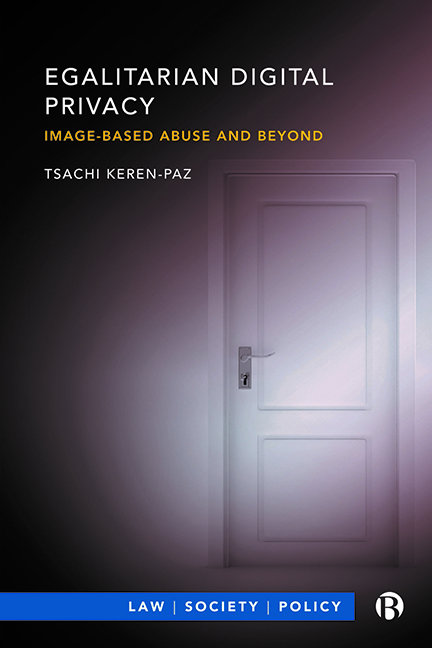Book contents
- Frontmatter
- Dedication
- Contents
- Acknowledgements
- Series Editor’s Preface
- 1 Introduction
- 2 Setting the Ground: The Intermediary Liability Debate and Framing Issues
- 3 First Principles and Occupiers’ Liability: The Case against Immunity
- 4 Property and Privacy: The Case for Strict Liability
- 5 Property and Privacy: Objections and Possible Extensions
- 6 The Policy Debate: Uniqueness of Harm from NCII
- 7 The Policy Debate: Freedom of Expression and Financial Costs of Filtering
- 8 The Easy Case for Viewers’ Liability: Child Pornography and Apportionment of Liability
- 9 Viewers’ Liability: Intention and Objective Fault
- 10 The Power of Property: Strict Liability for Viewing NCII
- 11 Scope of Liability for Breaches of Privacy
- 12 Is Suing Viewers Practicable?
- 13 Conclusion
- References
- Index
5 - Property and Privacy: Objections and Possible Extensions
Published online by Cambridge University Press: 17 January 2024
- Frontmatter
- Dedication
- Contents
- Acknowledgements
- Series Editor’s Preface
- 1 Introduction
- 2 Setting the Ground: The Intermediary Liability Debate and Framing Issues
- 3 First Principles and Occupiers’ Liability: The Case against Immunity
- 4 Property and Privacy: The Case for Strict Liability
- 5 Property and Privacy: Objections and Possible Extensions
- 6 The Policy Debate: Uniqueness of Harm from NCII
- 7 The Policy Debate: Freedom of Expression and Financial Costs of Filtering
- 8 The Easy Case for Viewers’ Liability: Child Pornography and Apportionment of Liability
- 9 Viewers’ Liability: Intention and Objective Fault
- 10 The Power of Property: Strict Liability for Viewing NCII
- 11 Scope of Liability for Breaches of Privacy
- 12 Is Suing Viewers Practicable?
- 13 Conclusion
- References
- Index
Summary
Introduction
In this chapter, I defend the conceptualization of intimate images as property against the ‘inalienability’ and ‘proliferation of property rights’ critiques by referring to the ‘inalienability paradox’: unless inalienable rights are afforded the stronger remedies available to owners, the rights become more alienable (Part 2). I then respond to the objection that treating intimate images as property will lead to an undesirable proliferation of quasi/property rights with respect to the same object: reduced alienability, which is the main argument against a proliferation of rights with respect to tradable goods, is in fact exactly the sought-after result for NCII. Finally, the considerations relevant to NCII do not necessarily apply to other contexts such as defamation and copyright. In this sense, the argument defended here lends support to the policy move (documented in Chapter 2) of departing from the EU horizontal approach towards contextual examination of the appropriate scope of intermediary liability. But it also supports a critique of the inverted hierarchy (clearly apparent in US law and emerging in EU law) according to which copyright holders have greater rights against intermediaries than NCII victims, while the reverse rule is much more defensible. Nonetheless, the analysis will suggest that the recent move to a de facto strict liability of (certain) hosts under the recent Copyright-Digital Single Market Directive is consistent with general principles governing the liability of merchants selling stolen property.
Privacy, property and inalienability
The Inalienability paradox
The usefulness of the analogy with conflicts over title hinges on accepting right to privacy over images (and more broadly private information or data) as a subject matter for property. This of course is disputed, so in what follows I shall clarify my view on this issue, and defend the usefulness of the property framework. The short answer to the question why a property framework is useful is that personal information, including images, could either be treated as property or not. If it should be treated as property, the analogy with conflicts over title clearly shows that the claimant (= the owner) should have priority over both the viewer and the intermediary, so that the image should not be allowed to circulate any further.
- Type
- Chapter
- Information
- Egalitarian Digital PrivacyImage-based Abuse and Beyond, pp. 72 - 85Publisher: Bristol University PressPrint publication year: 2023



